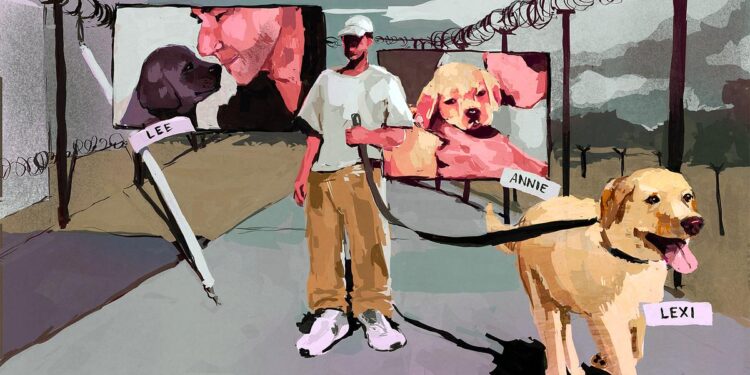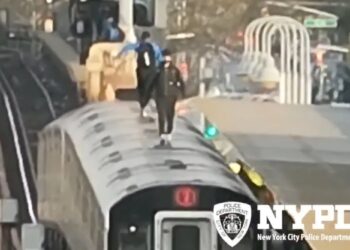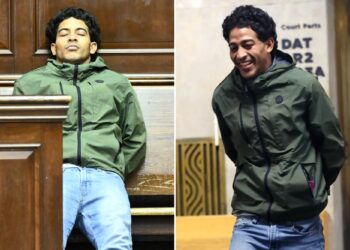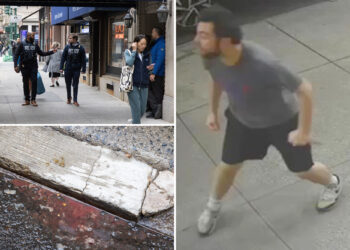Christmastime 2022 saw me getting up on another wall in Fishkill Correctional Facility. As in, painting another mural, the seventh since early November — when my pup Lexi left. I was staying busy to avoid spinning too adrift in a spacey dark void of loss.
“That’s why I couldn’t join that program,” my friend Ant said. He was talking about Puppies Behind Bars (PBB), a program that allows incarcerated people to live in a special unit and train Labrador retrievers to become service dogs.
I took my first PBB class in August 2019. I signed the puppy raiser contract, agreeing that if I was assigned a dog, it would stay with me no longer than two years before being placed with a wounded war veteran, first responder or law enforcement agency.
The housing unit for PBB was serene relative to the madhouse maximum security dorm I’d come from two months prior. Before I could set down my bags, two Labs came wagging over, sniffing out the new guy. I was so happy. Between the dogs, single rooms and the courtyard with trees, I didn’t feel imprisoned. And for the first time since 1999, I was touching a dog.
As the new guy, I looked for opportunities to contribute — exercising dogs, wiping them down, picking up poop. Outside of the weekly classes taught by outside instructors, I learned from senior raisers and by closely watching the dogs. I developed favorites: There was Charlotte, a big yellow girl, and Shadow, an elder statesman.
After a month, when instructors and peers deemed me ready, I was permitted to have my first overnight with a dog — Shadow — who slept in a crate in the room. For 24 hours, I was responsible for his feeding and toileting. I had to provide him with three hours of exercise and review commands he’d been taught by his raiser, Ron.
Ever since, I’ve been giving PBB my all, back-burnering my art and publishing, and decreasing the amount of hours I work as a peer counselor in Transitional Services.
In March 2020, when COVID-19 happened, there was death and deprivation the world over. But my life was a luxury vacation of sleeping in, playing with dogs, training, learning, napping, cooking elaborate meals, more playing, sleeping and repeating. Puppy life, at least, kept on. When Atticus was destined for a family (“fear barking” disqualified him from working as a service dog), I walked him to the gate, crying — he was the only pup who chose to hang out with me.
Three months into the pandemic, I was selected for a puppy! Lee arrived with siblings, Maddie and Jules. They were all beautiful black Labs, aged 10 weeks. On June 8, 2020, our bond began. I was now responsible for another’s well-being: I was Lee’s raiser, trainer and first responder. I celebrated every accomplishment, fretted over problematic behaviors and saved baby teeth to tape into the weekly journal we keep for our pups, showing the dog’s sponsor and their forever person what puppyhood was like. Oh, to be a Lab in its first years! And what you think of as a harsh prison, is actually a dog’s dream: pack mates ready to romp, humans who “speak dog” and weekend socialization trips to New York City with volunteers.
I was learning so much about dogs and their behavior, but also about softening my ego by asking others for help. Then November struck.
Through a video screen, I learned that Lee’s “environmental awareness” suited him for scent work. He’d be leaving for further training to become an explosive detection canine. You might envision a dog being blown up, but what I learned in preparing Lee is that detection work is fun for a dog. They get to sniff, jump, climb and find. On Dec. 21, 2020, I walked my best friend to the gate one last time, sobbing the entire way.
Over the six months we had together, I had watched Lee grow, helped him learn and nursed him post-neuter. When he left, I remember coming back to the unit and staring at a blank TV. I realized just how close we’d become and what he meant to me as someone who’s always looking to connect with others. It was a dark, cold winter.
When I was selected for my next pup, Lexi, I felt I wouldn’t be able to love her as I did Lee. I needn’t have worried. On Feb. 18, 2021, I got Lexi, a little yellow furball who looked up and, as I tucked her into my coat, sighed with contentment.
Every month, I charted her height on my door, and I began to think of her eventual departure. That summer, Lexi was chosen for breeding. Upshot: She’d be with me for at least another year.
The memories we made could fill a book, and someday will. Like all the dogs I’ve worked with, I brought Lexi to the facility’s weekly orientation for new arrivals. Guys on the compound, registering her growth, asked, “Is that the same dog?”
On May 6, 2022, Lexi began a two-month “swap” with Bedford Hills Correctional Facility, the women’s prison where Gloria Gilbert Stoga founded Puppies Behind Bars in 1997. (Fishkill was the next site, in 1998.) Swaps “generalize” the dog to working with others. Typically, a swap lasts one month, but Lexi’s was extended so I could work with Mikey, a funny, quirky girl who quickly grew on me. And it wasn’t just Mikey. There were other dogs who visited. Though I wasn’t their swap raiser, I enjoyed playing uncle to Lee’s brother, Vinny, and Lexi’s sister, Lori.
Still, every departure is a disconnection. It doesn’t get easier with practice, but I know I can do it. Though knowing is not always enough. With 24 years in prison and a parole hearing in sight, incarceration lands on me differently these days.
Is this a “darkest before the dawn” situation? PTSD? Anxiety and depression? Likely, it’s some funky combination. So, when I got the heads-up that Lexi would be staying for at least a year, I was partially relieved.
For 20 months we moved as partners. All you need to know about Lexi is that she’s a unicorn who happens to look like a dog. She is the best of all things: smart (seeming to learn commands by osmosis); spunky (ready to romp with big boys like her buddy, Jules); self-contained (making her own fun with toys in the yard); a rockstar partner (moving through crowds was a breeze). Because people aren’t used to seeing me without a dog, I could hear in advance, ‘Hey, where is she?’”
I resisted the urge to note our last time doing something — last nail cutting, last fetch session, last night in art class. When her final morning with me came, it was so hard.
I used all the tools: writing about it, drawing, talking to others, self-referring to a mental health clinician. Staying busy helping newer raisers and making art provided the gift of space and time to work through the loss of Lexi.
In the winter of 2023, with a week’s notice, I received Annie. She was my third dog, and puppy-proofing was old hat: set up the crate for a tiny pup, remove choking hazards from the floor and bank lots of sleep.
On Jan. 5, an instructor came after dark. She handed Phil, a puppy who looked like a baby polar bear, to my unit-mate Josue. She gave me Annie, a big-eyed little girl who was an animation studio’s version of cute. Annie’s a different dog from Lexi — they’re all unique — but she is equally lovely in different ways. She challenges me to be a better trainer.
Each of my dogs has been a teacher. Lee: Stay present, you can choose what you pay attention to. Lexi: Smile and get on with it. Annie has taught me the most. And what I’ve learned is that caring for others is my special purpose.
Annie may “graduate” this summer. She’ll be 20 months, and I’ll be going before the parole board after 25 years. Who knows? Maybe we’ll leave prison around the same time.
I sure hope so, but one thing is certain: Like the contract stipulates, we’ll part company. I will miss Annie something fierce. But I will move forward, richer for her unconditional love.
Adam Roberts is an artist, writer and actor. See his work on Instagram at @adam_drawseverything. He is serving time in New York for arson and murder.



























